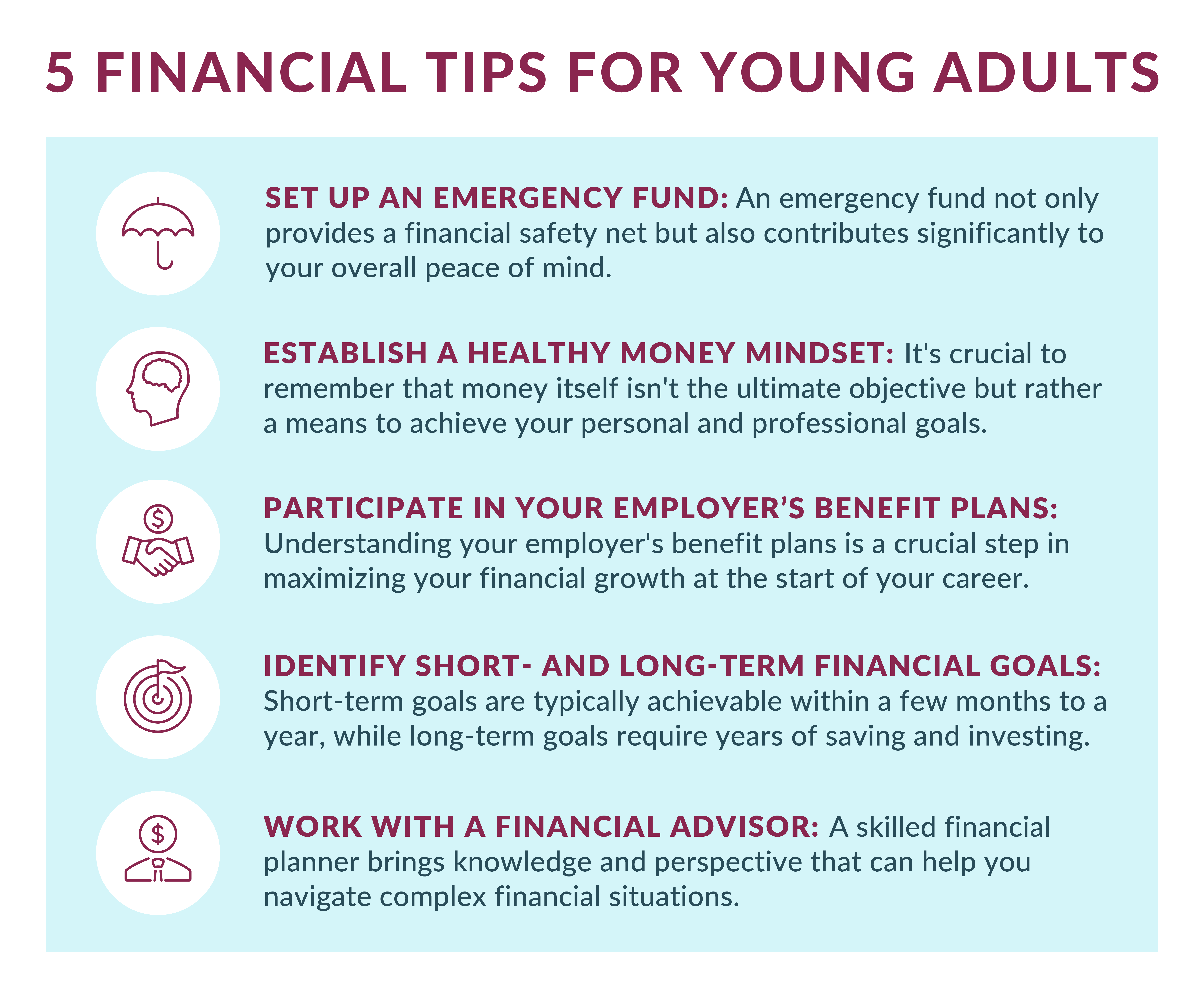SUMMARY
This article offers a comprehensive guide on financial tips for young adults, with insights from five of our trusted advisors. It covers crucial topics such as saving strategies and switching to a healthy money mindset, providing practical advice for financial stability and growth.
Whether you're starting your first job, managing student loans or setting up your savings, understanding the basics of personal finance is crucial. In this article, we'll explore five essential financial tips that’ll help you lay a solid foundation for a secure financial future, teaching you how to budget effectively, save wisely and make informed financial decisions. From building an emergency fund to understanding retirement contributions, these tips are designed to empower you to take control of your finances early on.
5 Financial Tips for Young Adults

1. Set up an emergency fund

Set up an emergency fund of $1,000 for unexpected life events. This fund is separate from your personal savings – commit to only using it in an unplanned situation. Having peace of mind is key to having financial success.
Creating an emergency fund is a foundational step in securing financial stability. By allocating $1,000 specifically for unforeseen expenses, you can shield your regular savings and daily budget from the impact of sudden financial demands. Whether it's an urgent car repair, an unexpected medical expense or even a temporary job loss, having this fund ensures that you can handle life's surprises without compromising your financial health. An emergency fund not only provides a financial safety net but also contributes significantly to your overall peace of mind, knowing that you are prepared for life's uncertainties.
2. Establish a healthy money mindset

Create a lifestyle that you can afford to live while developing a savings strategy to help you work towards having options later in life. Remember: Money is not the goal! Money is a tool to help you reach your goals.
Adopting a healthy money mindset involves more than just managing your finances – it's about creating a sustainable lifestyle that aligns with your financial capabilities and future aspirations. By living within your means and simultaneously crafting a robust savings plan, you pave the way for future financial freedom. It's crucial to remember that money itself isn't the ultimate objective but rather a means to achieve your personal and professional goals. This mindset not only helps in making important financial decisions but also in setting priorities that foster long-term stability and success no matter where life takes you.
Reminder: Your financial plan is not static – it will ebb and flow as you move throughout different life events and circumstances.
3. Participate in your employer’s benefit plans

Reading your company's benefit book in full is worthwhile when starting your career. If your employer offers retirement plans, take advantage of your employer contribution match to build wealth for future use.
Understanding your employer's benefit plans is a crucial step in maximizing your financial growth at the start of your career, especially when it comes to choosing employer-matched retirement contributions. By contributing enough to meet your employer's match, you double the impact of your savings efforts, accelerating the growth of your retirement fund. This not only helps in building a substantial nest egg for the future but also ensures that you are fully utilizing the financial benefits offered by your employer. Once you set up your retirement plan, you can then focus on building a budget to determine how much you can contribute from each paycheck.
4. Identify short- and long-term financial goals

Setting and prioritizing short-term and long-term financial goals is extremely important for any young professional.
Distinguishing between short-term and long-term goals is a crucial step when you first start your career. Short-term goals, such as saving for a vacation or paying off credit card debt, are typically achievable within a few months to a year. Long-term goals, like saving for retirement or buying a home, require years of dedicated saving and investing. By clearly identifying these objectives, you can create a structured financial plan that allocates your resources wisely, ensuring that immediate needs are met while also building a foundation for future aspirations. This approach not only helps in managing finances effectively but also helps you prioritize what you need to achieve a balanced, fulfilling life.
5. Work with a financial advisor

I highly recommend utilizing financial planning services. A financial planner will help you build wealth that may seem too far out of reach.
Working with a financial advisor can be a transformative step towards achieving financial freedom, especially when your financial goals seem daunting. A skilled financial planner brings knowledge and perspective that can help you navigate complex financial situations and make informed decisions. They can tailor strategies that align with your personal financial situation and goals, providing guidance on everything from investments to retirement and financial planning.
If you’re looking for personalized financial advice, connect with a Johnson Financial Group advisor to secure your financial future today.
